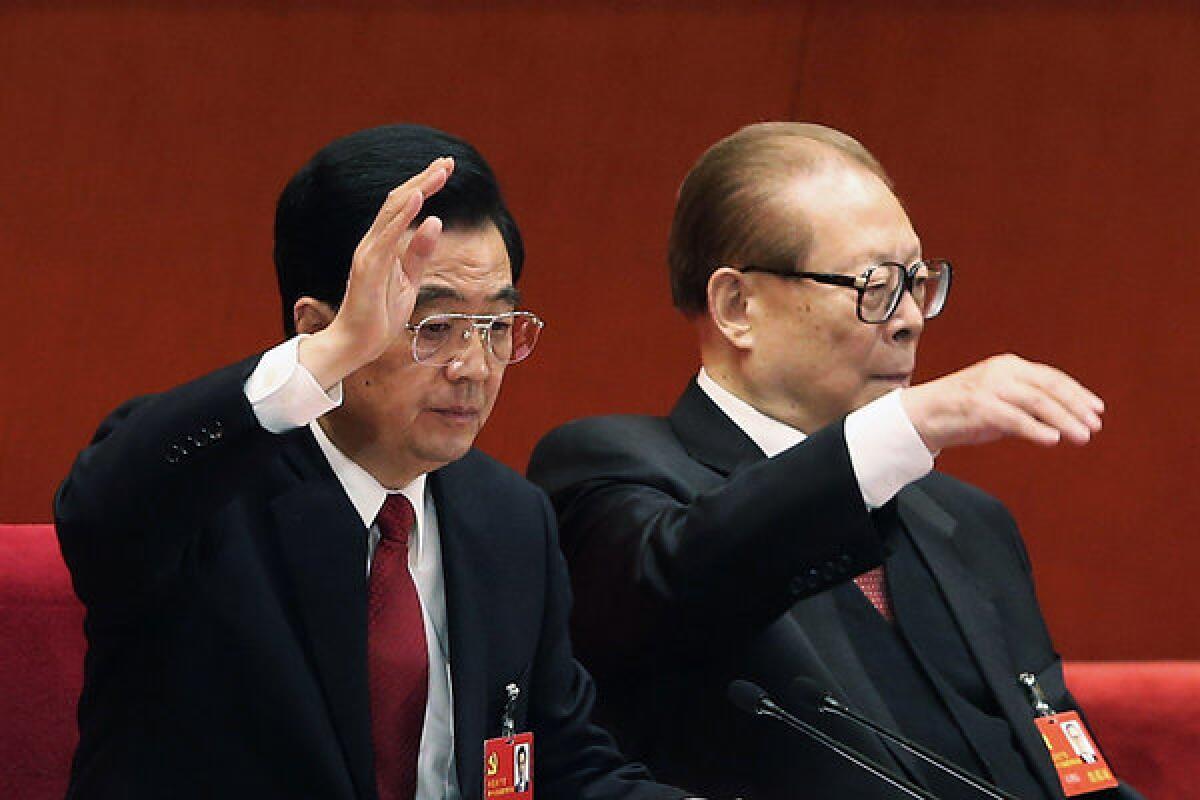China’s Communist Party wraps up congress with little sign of reform

BEIJING -- For Chinese yearning for reform, the 18th congress of the Communist Party that wrapped up Wednesday was a crushing disappointment, more about pageantry than real politics.
With no deviation from the script, President Hu Jintao stepped down as party secretary-general, a position he has held the last decade, to make way for Xi Jinping, his long-ago anointed heir.
In keeping with protocol, the 59-year-old Xi and others in the top echelon of the new leadership are to march out on the dais Thursday morning -- technically the first session of the new party government.
The identities of the Standing Committee members will not be revealed until then, but political analysts believe hard-liners have won out against more reform-minded choices.
With staging reminiscent of the old Soviet Union, the congress took place in the cavernous Great Hall of the People on Tianamen Square, the interior draped dramatically with red curtains. At the conclusion, the delegates stood to sing the “Internationale,” the socialist anthem.
Willy Lam, a China expert at the University of Hong Kong, said there is some disappointment that Hu, who once was seen as a reformer, wasn’t able to make much progress in opening up the party during his two five-year terms.
“Even though Hu has been talking about democracy within the party, nothing substantial has been achieved in terms of reform,” said Lam. “It’s a sad reflection on the state of affairs within the party. It’s still a Leninist structure, it’s still politics of old men and women.”
“This congress threw cold water on the people who hoped for reform,’’ said Jin Zhong, a veteran political analyst and writer based out of Hong Kong. He said that party wasn’t even following pro-democratic provisions of its own constitution.
That document calls for the congress’ delegates, 2,307 this year, to elect a party legislature called the Central Committee. The Central Committee in turn is supposed to elect the Politburo and the more-elite Standing Committee.
The vote for the Central Committee was held in a secret session Wednesday morning as reporters were crammed into a hallway behind locked doors. Footage broadcast later on state television showed the leaders and other delegates dropping their ballots into a red voting booth adorned with a hammer and sickle.
Actually, it wasn’t much of a choice at all; the day before the party had held a “preliminary” vote. There were 224 candidates for the 205 seats -- a key figure for Sinologists who gauge China’s glacial progression by the percentage more candidates there are than seats. This year it was 9.3%, just a hair more than during the last party congress in 2007.
However, there were hints that the process wasn’t entirely without a hitch this year. The state media did not release the names of the 205 selected candidates until the evening news -- an unexplained delay, coming almost eight hours after the election.
It was expected that CCTV, the state broadcaster, would air the closing ceremony live, and party members among the faculty and student body at some universities were instructed to watch. Instead, only excerpts were broadcast on the evening news.
“I think they didn’t want to take the chance of showing uncontrolled live images ... but rather prepare a carefully manicured version,’” suggested one political analyst who was involved with the state television coverage.
The leadership transition this year has been marked by fierce infighting -- fallout from the purge of Bo Xilai, the charismatic former party chairman in Chongqing whose wife was recently convicted in the poisoning death of a British businessman.
Bo, once a contender for the top leadership, still has many supported who see him as a latter-day embodiment of Mao Tse-tung’s vision.
“The whole meeting was very tense and uptight, more so than other congresses,’” said Ho Pin, a publisher and political analyst. “The atmosphere was almost like a funeral.”
During the week-long congress, Hu vowed China would not adopt “Western-style” reforms, a message that was loudly echoed in editorials in the state press.
A long-anticipated revision in the Communist Party’s constitution, which reformers thought might reduce the emphasis on Mao’s teaching, turned out disappointingly to be just a minor tinkering to pay tribute to Hu. The gathering also added language promising to better monitor corruption among party officials and protect the environment.
As far as democracy within the party is concerned, China lags behind Vietnam and even the former Soviet Union, where the party central committee twice rejected official nominees for the top jobs, said Susan Shirk, chair of the 21st Century China program at the University of California San Diego.
Shirk notes, however, that the party elders have held at least two “straw polls” in secret sessions that led to the decision to push Xi into the leadership, followed by Li Keqiang.
“You could say these are baby steps toward intra-party democracy,” said Shirk.
The fragile hopes for a more open China now rest with Xi, whose father in the 1980s helped Deng Xiaoping pry open the economy. Xi is considered a pragmatist who as party secretary in Fujian and Zhejiang provinces was known for his pro-business views.
Li, designated to take over Wen Jiabao’s position as premier, is also thought to be Western-friendly and more open than many others in the leadership.
ALSO:
Bleakness only a child’s smile can lift
Russia levies rare punishment for poaching tigers
Obama reassessing sensitive foreign issues now that election is over
-- Julie Makinen contributed to this report.
More to Read
Start your day right
Sign up for Essential California for news, features and recommendations from the L.A. Times and beyond in your inbox six days a week.
You may occasionally receive promotional content from the Los Angeles Times.






